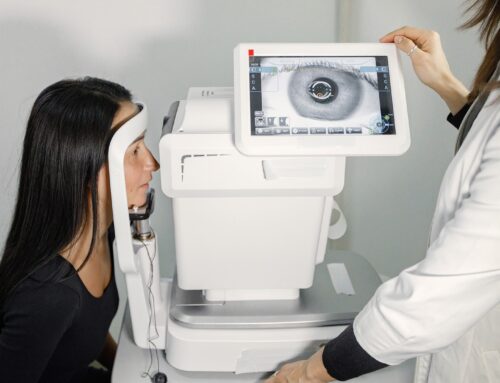LASIK is a popular laser procedure designed to correct vision problems such as myopia, hyperopia, and astigmatism. Since its introduction, millions of people worldwide have benefited from clearer vision without the need for glasses or contact lenses. However, a common question among those considering the procedure is: “Is LASIK permanent?”
In this blog, we will explore the permanence of LASIK, how long the results typically last, factors that can influence vision changes after LASIK, and what options are available if your prescription changes after the surgery.
What is LASIK?
LASIK is a type of laser vision procedure that uses a laser to reshape the cornea, which is the clear front part of the eye. This reshaping allows light entering the eye to be properly focused onto the retina, resulting in clearer vision.
How LASIK Works
- Consultation: Have a visit with an eye doctor to determine if you’re a good candidate and eligible for the procedure
- Preparation: Before the surgery, the eye is numbed with topical anesthetic drops.
- Creating a Flap: A thin flap is created on the cornea, most commonly with a laser
- Reshaping the Cornea: An excimer laser is used to remove tiny amounts of corneal tissue, reshaping the cornea to correct the vision.
- Repositioning the Flap: The corneal flap is then put back into place, where it adheres naturally without the need for stitches.
Benefits of LASIK
- Quick recovery time
- Minimal discomfort
- High success rate
- Long-lasting results
Is LASIK Permanent?
The effects of LASIK surgery are intended to be permanent. The changes made to the cornea are permanent.
However, it’s important to understand that while the structural changes to the cornea are permanent, other factors can influence the long-term stability of your vision.
Factors Affecting the Permanence of LASIK
- Aging: As you age, other parts of your eyes can change. As you approach the age of 50, the natural lens inside the eye stiffens, diminishing the range of vision. This is called “presbyopia”. This is unrelated to whether you have LASIK or not. Everyone develops presbyopia if they live long enough.
- Cataracts: Cataracts are another normal part of aging. Cataracts occur when the natural lens inside the eye becomes cloudy.
- Other Eye Conditions: Conditions such as macular degeneration or glaucoma can affect vision independently of LASIK surgery.
Once again, while the changes made to the cornea are permanent, it is normal for certain changes to occur to the eyes that may affect your vision as you get older. Other eye conditions may develop independent of whether you have LASIK or not.
How Long Does LASIK Last?
For most patients, the results of LASIK are long-lasting. Studies have shown that the majority of patients maintain excellent vision for many years after the procedure.
However, how long LASIK lasts can depend on what your prescription was before LASIK.
For example, most patients who have LASIK are nearsighted before their procedure. LASIK in nearsighted patients is much more stable and long-lasting compared to LASIK in farsighted patients.
While LASIK in farsighted patients can be less stable, this is often dependent on how high the farsighted prescription is. For example, most surgeons would agree that LASIK in a +1.50 patient should be much more stable and long-lasting than a +4.50 prescription.
Every patient is different, and this is an important personal question to ask your surgeon. However, for the average 25 year-old who is nearsighted, it is common to get decades of great vision. This patient should expect to be totally free from glasses until that age of approximately 45. Then at some point between the age of 45-55 they will likely need over-the-counter reading glasses. However, they may still be free from glasses for distance vision, including activities like driving, watching television, and outdoor activities.
If you are in the minority of patients who find their prescription changes over time, there are “touch-up” or “retreatment” options available for most patients.
How Can Your Vision Change After LASIK?
Even though LASIK is effective at correcting vision, various factors can lead to changes in vision after the procedure.
Age-Related Changes
- Presbyopia: This is a normal age-related condition where the eye’s lens becomes less flexible, making patients lose their range of vision. Presbyopia happens to everyone by the late-40’s or early 50’s. This is the reason individuals in this age group and older may need reading glasses or bifocals.
- Cataracts: Another age-related condition where the lens becomes cloudy, leading to blurred vision.
Other Eye Conditions
Other eye conditions can develop independent of whether you have LASIK or not. For example, these may include conditions like glaucoma, macular degeneration, optic neuropathies, and others.
Health Conditions
Certain health conditions can affect vision, such as diabetes, which can lead to diabetic retinopathy.
What if Your Prescription Changes After LASIK?
It’s possible for your vision to change after LASIK due to various factors, including the natural aging process.
Enhancements
If vision changes significantly after LASIK, a second procedure, often called an enhancement or touch-up, may be performed to fine-tune the correction. This is generally less common and depends on individual circumstances.
Can You Have LASIK Again?
In some cases, a second LASIK procedure, often referred to as an enhancement, can be performed if there are significant changes in vision after the initial procedure. There may be limitations on who is a candidate for an enhancement.
Criteria for a LASIK enhancement
Every patient must be looked at individually, but here are some general guidelines that surgeons may use to consider whether a patient is a good candidate with a LASIK enhancement:
- Adequate Corneal Thickness: The cornea must be thick enough to undergo another reshaping.
- Time from Original Procedure: Most surgeons feel comfortable performing a LASIK enhancement for up to 5 years after the original treatment. With modern lasers, some surgeons are finding that this period can be extended longer.
- Stable Prescription: The vision prescription should be stable.
- Good Overall Eye Health: The eyes should be free from other conditions that could affect surgery outcomes.
Conclusion
LASIK surgery offers a potentially life-changing solution for those with vision problems, providing clearer vision and reducing the need for glasses or contact lenses. While the structural changes of LASIK on the cornea are generally permanent, various factors such as aging and health conditions can influence long-term vision stability.
Understanding these factors is important when considering LASIK. If vision changes occur, options like enhancement procedures or corrective lenses are available to help maintain optimal vision. Always consult with an eye care professional to determine the best course of action based on your individual needs and circumstances.






